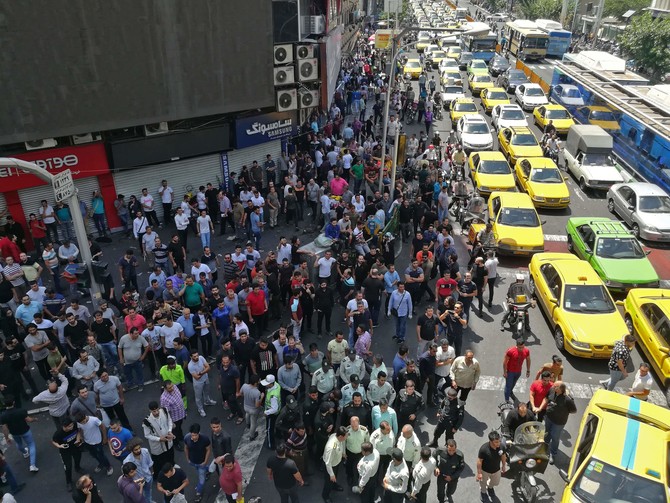DUBAI: Protesters angered by Iran’s cratering economy confronted police in front of parliament on Monday, with security forces firing tear gas at them, according to online videos, the first such confrontation after similar demonstrations rocked the country at the start of the year.
The unplanned demonstration came a day after protests forced two major shopping centers for mobile phones and electronics to close in Tehran and after demonstrators earlier closed its Grand Bazaar.
It signaled widespread unease in the wake of President Donald Trump’s decision to withdraw America from Tehran’s nuclear deal with world powers and restore sanctions on the country.
It wasn’t immediately clear who led the protests. Iran’s semi-official news agencies, Fars, ISNA and Tasnim, described the protests at the Grand Bazaar as erupting after the Iranian rial dropped to 90,000 to the dollar on the country’s black market, despite government attempts to control the currency rate.
Videos posted to social media showed protesters at the bazaar heckling shopkeepers who refused to close, shouting in Farsi: “Coward!“
A short time later, about 2 kilometers (1.25 miles) from the Grand Bazaar, videos shared by Iranians on social media appeared to show a crowd confronting police at parliament. The videos show tear gas in the air and protesters screaming, “They attacked us with tear gas!” Another man is heard shouting: “Come back!“
#IranProtests update from Tehran: Iran regime fires teargas as thousands of protesters march toward Parliament with chants of "Leave Syria alone. Think of us instead" & "Death to the dictator". The world can support them in the diaspora's June 30 #FreeIran2018 convention in Paris pic.twitter.com/SGOE5e20ck
— M. Hanif Jazayeri (@HanifJazayeri) June 25, 2018
Other videos appeared to show police charging into the crowd.
State media in Iran did not immediately report the Grand Bazaar demonstration. Only Fars reported on the parliament protest, which it described only as shopkeepers asking lawmakers to “stop rising prices.”
The head of Iran’s Chamber of Guilds, Ali Fazeli, later was quoted by Tasnim as saying the situation at the bazaar is calm.
“Their demands are delivered through the chamber to the government, and these are being pursued by us,” he said.
#Breaking: Protests expand in Tehran today, 6/25. Crowd chants: "We will die, will take back Iran," "Iranians will die, will not accept humiliation." #FreeIran2018 #IranRegimeChange .@SecPompeo @NCRIUS pic.twitter.com/rPfUURzTbW
— Ali Safavi (@amsafavi) June 25, 2018
Tehran’s sprawling Grand Bazaar has long been a center of conservatism in Iranian politics and remains an economic force within the country — despite the construction of massive malls around the city. Bazaar families opposed the Iranian Shah Mohammad Reza Pahlavi and supported the 1979 Islamic Revolution that replaced him with a Shiite theocracy and elected officials.
At the end of last year, similar economic protests roiled Iran and spread to some 75 cities and towns, becoming the largest demonstrations in the country since its 2009 disputed presidential election. The protests in late December and early January saw at least 25 people killed and nearly 5,000 arrested.
However, those protests largely struck Iran’s provinces as opposed to Tehran itself. Analysts believe hard-liners likely encouraged the first protest that took place in Mashhad to try to weaken President Hassan Rouhani, a relative moderate. The protests then spiraled out of control, with people openly criticizing both Rouhani and Supreme Leader Ayatollah Ali Khamenei.
Rouhani’s government has struggled with the economic problems, including high unemployment. A government-set exchange rate of 42,000 rials to $1 has generated a vibrant black market. On Monday, state television quoted Iranian Central Bank chief Valiollah Seif as saying the government plans to create a parallel market next week to combat the black market.
Meanwhile, some hard-liners have called for new elections or for Rouhani’s civilian government to be replaced by a military-led one. The Fars news agency, believed to be close to Iran’s hard-line paramilitary Revolutionary Guard, made a point Monday to publish an article from the Sobh-e No daily newspaper describing the government as being ready to “bow down to foreign threats and sit at the negotiation table.”
Eshaq Jahangiri, Iran’s first vice president, was quoted Monday as saying “we’re on the verge of an economic war by an economic terrorist,” referring to the United States.
“Conditions will get worse in future,” Jahangiri said, according to the pro-reform Etemad daily newspaper. “Even our friends and neighbors like Russia, China and Europeans can’t help us today.”


























